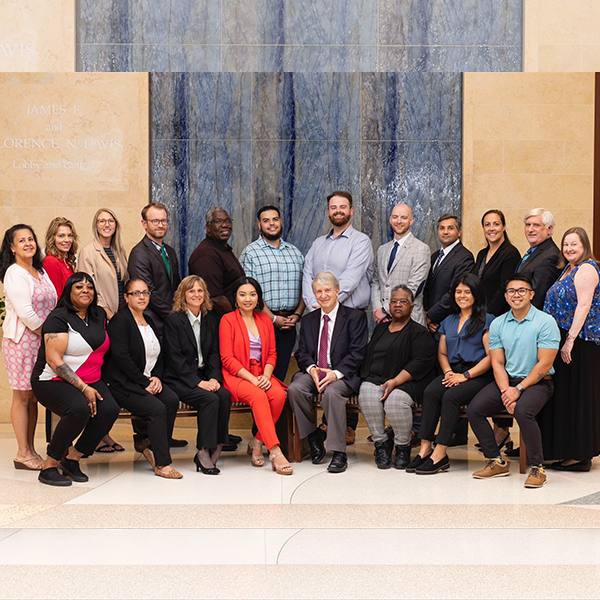-
Research
Meet William Bobo, M.D. – taking the guesswork out of finding the right depression therapy

Depression can touch every aspect of a person’s life – affecting the way they think, feel and behave. It is also the leading medical condition for those who complete suicide. Getting the right therapy is crucial. But for patients suffering from the disorder, finding an effective treatment often involves trial and error. That’s because it takes time for antidepressants to work. For physicians, it can be challenging to select a therapy because each patient has different symptoms and disease severity.
That’s why psychiatrist William Bobo, M.D. of Mayo Clinic’s Florida campus is studying whether applying artificial intelligence can help guide health care providers to the right antidepressant on the first try. Dr. Bobo collaborated with Mayo Clinic and University of Illinois Urbana-Champaign (Illinois) researchers, with support from the Center for Individualized Medicine, to develop a model that combines genomics and clinical assessments to uncover patterns of how patients respond to antidepressants.
Team science yields a model to predict treatment outcomes
Dr. Bobo worked closely with the Illinois team led by Ravishankar Iyer, Ph.D., through the Mayo Clinic and Illinois Alliance for Technology-Based Healthcare, along with Richard Weinshilboum, M.D., and Liewei Wang, M.D., Ph.D., co-directors of the Center for Individualized Medicine Pharmacogenomics Program, to develop a computational model.
The model was initially tested using data from three studies where patients had been treated with selective serotonin reuptake inhibitors, a group of antidepressant medications.

“Using artificial intelligence innovations to harness the power of pharmacogenomics data and to identify disease subtypes, we were able to predict with 75-85 percent accuracy whether a common antidepressant drug would work for each patient in the study. That compares to 58-62 percent accuracy when predictions are based on clinical, demographic and social factors alone,” explains Arjun Athreya, Ph.D., who began working with the team as a Mayo Clinic and Illinois Alliance predoctoral fellow and is now a principal data scientist in the Department of Molecular Pharmacology and Experimental Therapeutics at Mayo.
“By bringing together clinicians, engineers and biologists to create the algorithm, we uncovered patterns of antidepressant response that each of these specialists alone might not be able to recognize,” he adds.
The team also used the model to identify early milestones of treatment benefit. This second study included patients treated with another class of antidepressant therapy, serotonin–norepinephrine reuptake inhibitors.
“What are the early signs that a particular therapy is working? This is a question that physicians and patients often ask. Using our model, we were able to identify specific changes in core symptoms that needed to occur four weeks into treatment to accurately predict favorable response at eight weeks,” says Dr. Bobo.
Next steps – a decision tool to help physicians select the right therapy
Dr. Bobo and his colleagues hope to validate their findings in clinical trials and replicate their results across different types of antidepressants.
To help move the model into patient care, they have developed a web-based clinical decision support tool for physicians.
“Our goal is to develop artificial intelligence tools that generate insights to augment clinicians’ treatment management practices. In this way, the artificial intelligence technology is a clinician’s companion in delivering the best of care for our patients,” says Dr. Athreya.
The team also plans to build a continuous learning feature into the model, allowing for new discoveries to be incorporated into the algorithm.
A passion for psychiatry and clinical research
While he always wanted to pursue a career in medicine, Dr. Bobo never considered psychiatry until his third year of medical school at University of Missouri-Columbia. That’s when he was first asked to get to know five patients, each with a different psychiatric disorder, and describe what it was like to have each of their conditions.
“After meeting these patients, I was hooked,” he says.
He went on to complete his residency at the National Capital Consortium: Walter Reed Army Medical Center and the National Naval Medical Center and served as a psychiatrist in the Navy until 2006.
“I made the difficult decision to leave the military and pursue a career as a clinical investigator. I wanted to directly participate in research to find new, more precise treatments for patients.”
While doing his clinical fellowship and earning a Master’s in Public Health at Vanderbilt University, he decided to focus his clinical and research efforts on severe mood disorders.
Looking back, Dr. Bobo says the opportunity to collaborate on research that will directly impact patients is what brought him to Mayo Clinic.
“Our model has exciting possibilities, because as a psychiatrist, nothing is more frustrating than to watch patients suffer through antidepressants that don’t work. It can take months to find the right medication under current prediction models. This tool may help patients enjoy a better quality of life sooner,” he says.
Stay informed
Want to read more stories like this one?
Register to get weekly updates about new stories on Mayo Clinic Center for Individualized Medicine blog.
Join the conversation
For more information on the Mayo Clinic Center for Individualized Medicine, visit our blog, Facebook, LinkedIn or Twitter at @MayoClinicCIM.







